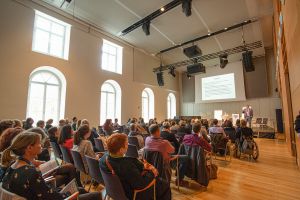With knowledge becoming increasingly digitised and access to knowledge consequently becoming more or less unlimited, upholding academic integrity at university-level institutions worldwide is more important than ever. For this reason, the German-speaking region recently witnessed its first international conference devoted to precisely this topic: the Vienna Days of Academic Integrity on 25 and 26 September at the mdw featured comprehensive discussion of current challenges with regard to good academic practice and plagiarism.

The over 100 participants from Austrian, German, and Swiss universities and other tertiary-level institutions were treated to impressive keynote addresses and inspiring workshops on the topics of prevention, ghostwriting, and training. The major focuses here were the idea of prevention and the introduction of suitable methods.
What made this conference special was the mix of different fields represented by the speakers, who hailed from a total of seven countries, and the consequent multiplicity of approaches to the conference theme. The organiser was the mdw’s Competence Centre for Academic Integrity, led by Martina Baravalle and Karl-Gerhard Straßl (of the mdw administrative unit ORB – Organisational Law and Appointments Management for University Professors)—both of whom have been active for many years in international networks and hold regular lectures and workshops.
With regard to prevention, keynote speaker Tracey Bretag (University of South Australia) called on her years of research to emphasise how preventive teaching and targeted didactic measures, in combination with individual universities’ real-life cultures, represent the foundation of academic integrity. And the group of workshops that were held in parallel thereafter featured special plagiarism-related focuses ranging from grey areas to plagiarism’s avoidance.
It was on ghostwriting, also referred to as “contract cheating”, that the invited keynote speaker Michael Draper (Swansea University, UK) focussed, emphasising the importance of appropriate university rules and also stressing work together with students on an equal footing as a way to prevent such cheating from taking place. The workshops that ensued dealt with the how to detect works written with ghostwriters’ help as well as with the challenges of developing appropriate counter-measures.
The first day concluded with the fascinating and wide-ranging panel discussion “Wissens(un)kultur – Wissenskultur(en)” [Culture(s) and Barbarism(s) of Knowledge], which involved Nicole Föger (ÖAWI), Ursula Hemetek (mdw), Johannes Meissl (mdw), Andrea Schencker-Wicki (University of Basel), and Klement Tockner (FWF), as well as Marlene Nowotny (ORF/Ö1) as the moderator.
On day two, Otto Kruse (Zurich), whose keynote shed light on the topic of integrity from the perspective of writing didactics, forged an impressive thematic link with training opportunities and offerings for writers. And in keeping with this shift in focus, the subsequent workshops looked at innovative approaches to training—in terms of methodology as well as university-specific factors.
At the closing ceremony, the organisers expressed their pleasure at this conference’s success, and they were also pleased to announce the “Vienna Days of Academic Integrity Vol. 2” in September 2021 at the mdw, which will double as the 7th International Conference of the European Network for Academic Integrity.

